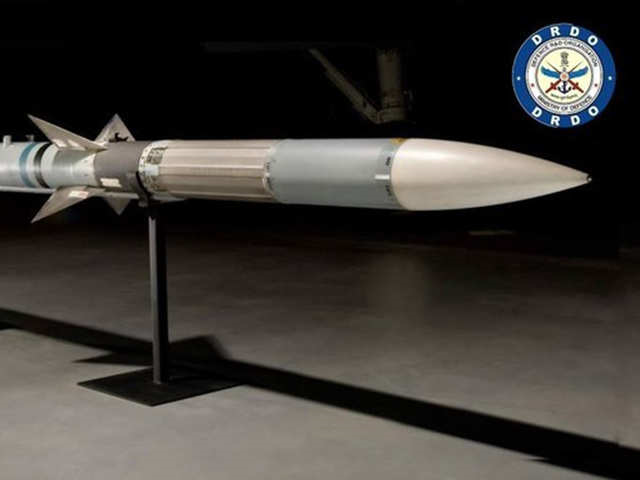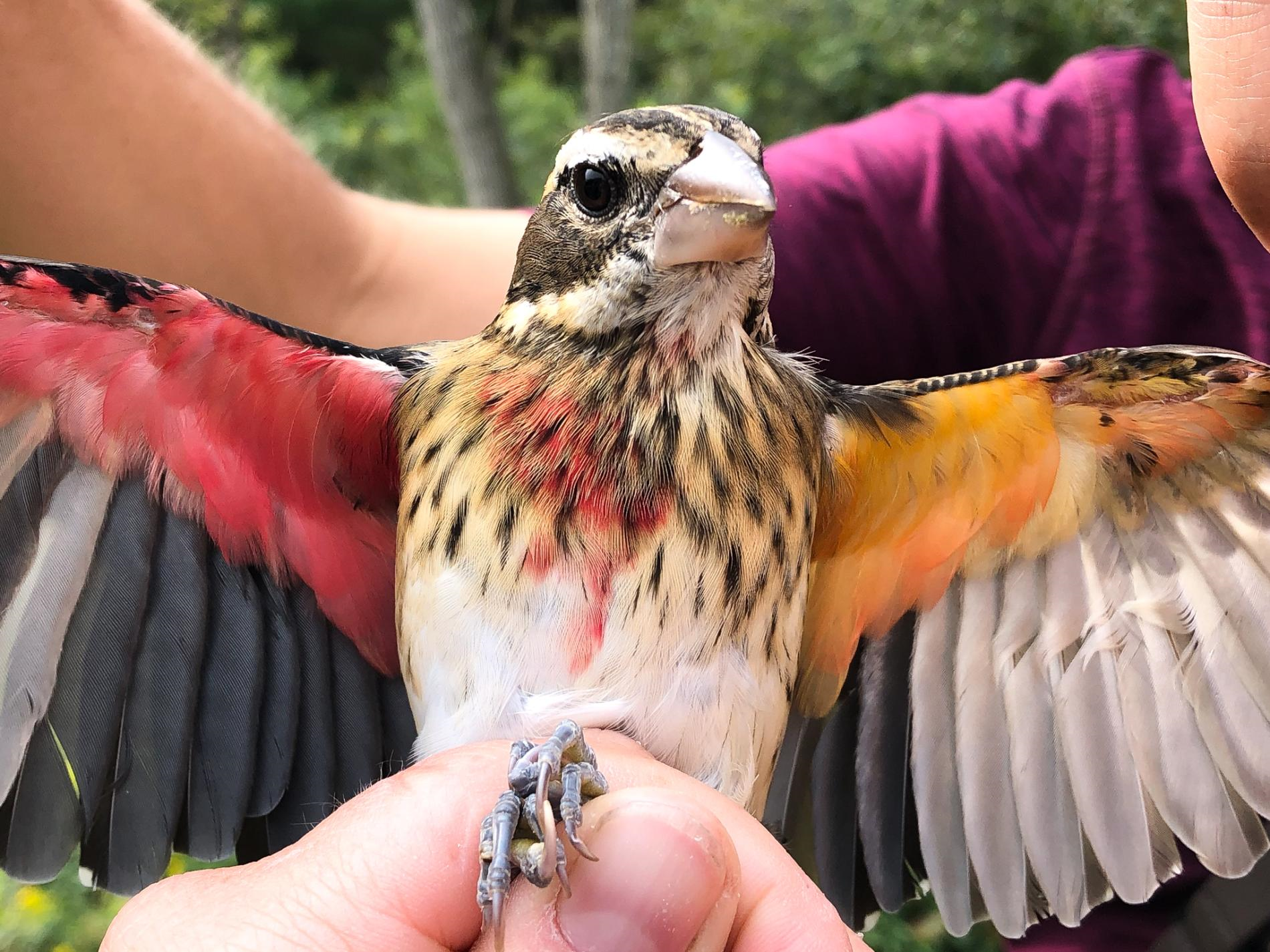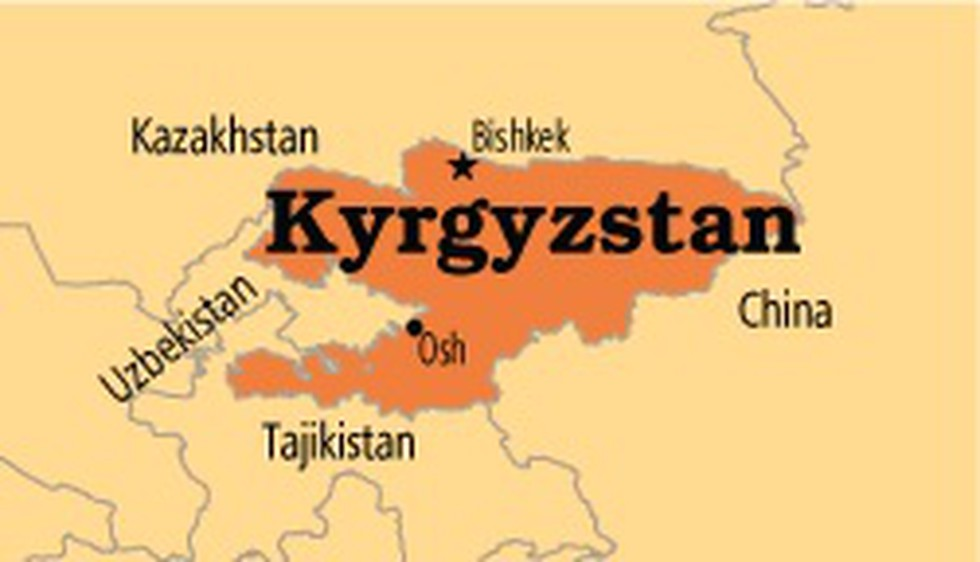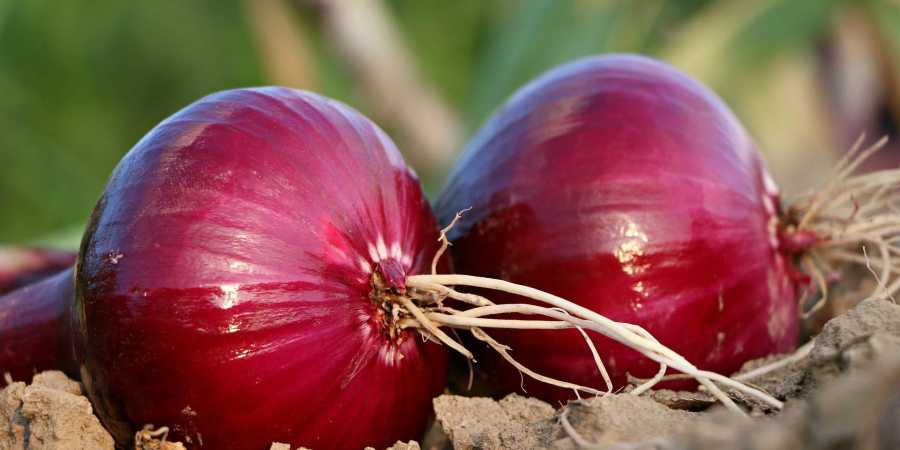IASbaba's Daily Current Affairs Analysis

Archives
(PRELIMS + MAINS FOCUS)
Animal in news: Rose-Breasted Grosbeak
Part of: GS Prelims and GS-III – Biodiversity
In news
- A rare Rose-breasted Grosbeak was recently found in Pennsylvania, USA.
- It is a bird with both female and male plumage colours (sexually dimorphic).
- It derives its name from the male of the species who have a ruby-red triangular marking on a white chest and dark black wings with pink wing pits.
- The females are much less showy, with no patches on its beige body, brown wings and yellow wing pits.
- Breeding habitat consists of cool-temperate open deciduous woods in eastern North America. They migrate to tropical America in winter.
- IUCN status: Least Concern.

Important value additions
Gynandromorph
- Bilateral gynandromorphism means the bird is both male and female, with one ovary and one testis.
- This occurs when two sperms fertilize an egg that has two nuclei instead of one, due to which the egg develops chromosome from each sex.
- It is often seen in insects but gynandromorphic birds, snakes, lobsters and other animals have also been observed.
Animal in news: Furry Puss Caterpillars
Part of: GS Prelims and GS-III – Biodiversity
In news
- It is a southern flannel moth in its larva stage.
- After metamorphosis, the insect does not pose any threat.
- It closely resembles a wig or toupee.
- It is widely regarded as one of the most poisonous of its kind in the USA.
- The bristly hair that coats it, hides small and toxic spines that can get lodged in a person’s skin and cause immediate and intensely burning pain.
- The caterpillars, which subsist solely on oak and elm leaves, are commonly found in parks and near structures in southern states like Texas and Missouri.

Country in news: Kyrgyzstan
Part of: GS Prelims and GS-II – International Relations
In news
- Kyrgyzstan was in news recently due to violent protests in the country.
- It is witnessing one of its worst political crises in decades.
Important value additions
Kyrgyzstan
- It is a landlocked country in Central Asia.
- It is often referred to as the only democracy in the region.
- It is also known as Kirghizia.
- It borders Kazakhstan, China, Tajikistan and Uzbekistan.
- It’s the second-smallest of the five Central Asian states.
- Capital: Bishkek.
- The mountainous region of the Tian Shan covers over 80% of the country.

8 Indian beaches awarded with Blue Flag
Part of: GS Prelims and GS-III – Environment; Climate change; Pollution
In news
- 8 beaches of India have been awarded the “Blue Flag” by an International Jury comprising of eminent members from UNEP, UNWTO, FEE, IUCN.
- Beaches: Shivrajpur (Dwarka-Gujarat), Ghoghla (Diu), Kasarkod and Padubidri (Karnataka), Kappad (Kerala), Rushikonda (AP), Golden (Puri-Odisha) and Radhanagar (A&N Islands).
- Accorded by: The Foundation of Environment Education (FEE) Denmark
Key takeaways
- India is also the first country in Asia-Pacific region which has achieved this feat in just about 2 years’ time.
- India is now in the league of 50 Blue Flag countries.
- SICOM, MoEFCC, carried out BEAMS – Beach Environment & Aesthetics Management Services under its Integrated Coastal Zone Management (ICZM) project.
- Aim of BEAMS: To strive for the International eco-label Blue flag.
Important value additions
Blue Flag certification
- The ‘Blue Flag’ is a certification that can be obtained by a beach, marina, or sustainable boating tourism operator.
- It serves as an eco-label.
- The certification is known as an indication of high environmental and quality standards.
- Blue Flag beaches are considered the cleanest beaches of the world.
- The certification is awarded by the Denmark-based non-profit Foundation for Environmental Education (FEE) with 33 stringent criteria under four major heads for the beaches: (i) Environmental Education and Information (ii) Bathing Water Quality (iii) Environment Management and Conservation and (iv) Safety and Services.
- The Blue Flag Programme started in France in 1985 and in areas outside Europe since 2001.
Rudram: India’s first indigenous anti-radiation missile
Part of: GS Prelims and GS-III – Defence; Security
In news
- Recently, Rudram was successfully flight-tested from a Sukhoi-30 MKI jet off the east coast.
- It is India’s first indigenous anti-radiation missile
- It is developed for the Indian Air Force.
Important value additions
Anti-radiation missile
- Anti-radiation missiles are designed to detect, track and neutralise the rival’s radar, communication assets and other radio frequency sources.
- Such a missile’s navigation mechanism comprises an inertial navigation system coupled with GPS, which is satellite-based.
- For guidance, it has a passive homing head which is a system that can detect, classify and engage targets over a wide band of frequencies.
Rudram
- Rudram is an air-to-surface missile.
- Designed and developed by: Defence Research and Development Organisation (DRDO)
- Once the Rudram missile locks on the target, it is capable of striking accurately even if the radiation source switches off in between.
- The missile has an operational range of more than 100 km.
- Along with Sukhoi-30 MKI, it can be adapted for launch from other fighter jets too.

Raychaudhuri Equation
Part of: GS Prelims and GS-III – Science & Technology
In news
- Recently, Kolkata-born physicist Amal Kumar Raychaudhuri was in news when British physicist Dr Roger Penrose was awarded half the Nobel Prize in Physics 2020 for his work on black holes.
Key takeaways
- The Raychaudhuri Equation in General Relativity was derived by Raychaudhuri.
- It is a fundamental result in general relativity which describes how nearby bits of matter move.
- The Equation was discovered independently by Raychaudhuri and Soviet physicist Lev Landau as a simple, general validation of the expectation that gravitation is a universal force that attracts objects with mass and energy (and Newton’s theory of gravitation).
- The Raychaudhuri Equation continues to be a key tool in investigating the behaviour of black hole horizons in modern physics.
Miscellaneous
Bangalore rose onion
- It is locally called gulabi eerulli.
- It is a variety of onion grown in and around Bangalore, Karnataka. \
- These are not cultivated in any other place in India.
- The onions of this variety have bulbs with flat base and are spherical.
- These have deep scarlet red colour, anthocyanin, phenols and high pungency.
- They also contain higher levels of protein, phosphorus, iron and carotene.
- It got the Geographical Indication tag in 2015.

(MAINS FOCUS)
ECONOMY/ GOVERNANCE/ SCIENCE & TECH
Topic: General Studies 3:
- Awareness in the fields of IT
- Challenges to internal security through communication networks, role of media and social networking sites in internal security challenges, basics of cyber security
The dominance of big tech
Context: US House of Representatives panel submitted the report of a bipartisan investigation into the working of Amazon, Apple, Google and Facebook.
Why was the House of Representatives probing big tech companies?
- There were allegations and concerns that these big tech companies have exploited, entrenched and expanded their power over digital markets in anti-competitive and abusive ways.
- Also, due to their metastatic growth, they now have a vast influence on politics, policy and personal reputations across the spectrum, making cost of data privacy breaches by these firms catastrophic.
Concerns of each platform
- Amazon: It is an online sales platform has disrupted the traditional business of retail sellers and small business. Allegations that Amazon favours its own self-branded products over those of third-party sellers through manipulation of search results.
- Apple: Its App Store policies, specifically regarding how Apple ranks search results on that platform, is questioned as it has lead exclusion of certain competing apps from the Store (Ex. Spotify). Questions have also been raised on how Apple determines the share of revenue it takes from in-app purchases
- Facebook: Regulators have focused their attention on Facebook’s acquisitive streak in capital markets, for example, the U.S. Federal Trade Commission (FTC) enquiry into whether Facebook defensively purchased certain companies (Instagram & Whatsapp) to maintain its dominant market position in the social networking ecosystem.
- Google: This company handles more than 90% of online searches across the world. In recent years concern has grown over the fact that Google has increasingly been sending users to its own sites to answer their queries, including products such as Google Flights and Google Maps.
- Thus there are allegations of abuse of its dominance in internet search, advertising and its mobile system, to the detriment of rival content producers. The European Union has already fined Google $5.1 billion in 2018.
What are the findings of US Panel?
- The panel observed that the answers by Bezos, Cook, Zuckerberg and Pichai – heads of these Big tech Companies- were often “evasive and non-responsive”. This raised questions whether they considered themselves “beyond the reach of democratic oversight”.
- The panel said each of these companies was now acting as a “gatekeeper” over a key channel of distribution, which meant that they had full control over what went on in their respective domains.
- By controlling access to markets, these giants can pick winners and losers throughout our economy.
- In a way, the panel said, these companies ran the marketplace for their respective domains, while also competing in it. And to ensure they retain the number one position, the companies have restored to self-preferencing, predatory pricing, or exclusionary conduct.
What has the panel recommended?
- Structural separations of the big tech companies: What this essentially means is that the panel wants these companies to be broken into smaller companies to ensure that they would not be able to have as much influence as they have currently over the digital marketplace.
- Another recommendation of the panel is that these companies be prohibited from operating in an “adjacent line of business”.
- A third recommendation is that there should be a “presumptive prohibition” against big tech companies going for mergers and acquisitions.
What global impact could the US panel recommendations have?
- Although the recommendations of the House panel are not legally binding on either the US government or any other agency, it could set the ball rolling in the direction of more controls.
- For example, the panel has said Congress should bring back its culture of probing and asking tough questions of companies that seem to break monopoly and anti-competitive laws
- These recommendations may not impact any big tech companies directly as of now, but could increase the scrutiny of regulators and probe agencies worldwide.
What did the probe find about big tech influence in India?
- The role of the of big tech companies in stifling competition in India finds mention in the US panel’s report.
- The report refers to the various antitrust probes going on against Google in India.
- In the last two years, the Competition Commission of India (CCI) has raised issues with Google’s commercial flight search option, its dominant position in the search marketplace, the abuse of its dominant position in the Android phone and smart television market, and others
- In 2019, CCI had held Google guilty of misuse of its dominant position in the mobile Android market and said the company had imposed “unfair conditions” on device manufacturers to prevent them from using other operating system
- Recently, Google has also been accused of following a high and unfair commission mechanism for apps listed on its Play Store
Impact of US Report on India’s regulatory Space
- With the US House panel focusing on the dominance of big tech companies across the world, the companies are likely to come under more scrutiny from regulators including the CCI in India.
- In coming years, as India plans to regulate the use of personal and non-personal data, these tech companies could face scrutiny over how they manage and use the data they collect from users in India
- Amazon and Facebook, which are trying to enter the retail space in India, are also likely to be under the lens for the way they price their products and the space they give/deny to their competition
Conclusion
Free and Fair market is needed to balance the need for innovation and to protect the rights of people & society
Connecting the dots:
- Should India also launch Joint Parliamentary committee to investigate whether these tech giants are indulging in anti-competitive trade practices in India?
- If these tech giants are broken up, would it impact the digital revolution which is witnessed around the globe and also in India?
INTERNATIONAL/ SECURITY
Topic: General Studies 2:
- Effect of policies and politics of developed and developing countries on India’s interests
Australia-China ties have gone down under
Context: Australia and China’s cordial economic ties, established over the last three decades, have been soured this year over several points of friction.
China-Australia Relationship
- Trade: China is Australia’s largest trading partner in terms of both exports and imports. China’s share in Australia’s exports reached a record A$117 billion, or 38 per cent, in 2019, more than any other country.
- Investment: Over the years, China has been increasing its investment in Australian infrastructure and real estate products too.
- Tourism & Education: The maximum number of foreign students in Australian universities and tourists also originate from China.
- Important Sectors: Australian sectors like mining, tourism, education benefit from trade with China. China even imports products such as milk, cheese, wine and meat
Points of friction
This year, many issues have dominated the deteriorating relationship between the two countries.
- Australia’s Covid-19 inquiry and China’s Economic response
- In April 2020, Australia suggested the start of an inquiry into the origins and the initial handling of the coronavirus.
- China alleged that Australia was teaming up with the US to spread “anti-China propaganda”.
- China further called for boycotting Australia as a tourist and higher education destination and banning Australian products like wine and beef.
- In May, Chinese authorities imposed an 80 per cent tariff on barley imports coming from Australia. China is the most important market for Australia barley.
- China also began a trade probe into Australian wine and suspended import permits for four large beef processing plants.
- Tension over journalists
-
- The second diplomatic spat began with the detention of Cheng Lei, an Australian news anchor based in Beijing by the Chinese authorities after she was suspected of “criminal activities” that endangered China’s national security
- After this, two more Australian journalists working in China were questioned and declared persons of interest in the Cheng Lee detention case
- Following their house searches, the journalists sought refuge in Australian diplomatic missions, as they were not allowed to leave the country.
- The tensions were on full display for five days after which China finally agreed to allow them to fly back to Australia.
- After their departure, there are no more Chinese reporters employed by the Australian media left in the country, a first since the 1970s.
- Few days after their departure, China’s state news agency Xinhua released a report that claimed the Australian intelligence had raided an unspecified number of Chinese journalists stationed in Australia
- Ideological issues
- The two countries have also been at loggerheads on other ideological issues previously too.
- After reports of China keeping Uighur Muslims in state-run detention camps surfaced, Australia was swift to respond and expressed “deep concern” over the “human rights situation.”
- Similarly, after China imposed the National Security Law in Hong Kong, Australia suspended its extradition treaty with Hong Kong and said the law undermines Hong Kong’s autonomy and suppresses opposition to Mainland China
- Australia also decided to extend visas for Hong Kong residents. In both instances China responded staunchly and asked Australia to not meddle in its “internal matters.”
What is the impact on India?
- Australia has started looking for way to wean itself away from this excessive Chinese dependence and is keen to strengthen its ties with more ideologically compatible allies like India.
- Thus, there is scope to increase the India-Australia bilateral trade and investment.
- Australia has expressed the need to connect with more “like-minded democracies” to counter the Chinese aggression and expansion.
- At the Quadrilateral Initiative, or the “Quad” with counterparts from India, United States and Japan, Australian highlighted the need for an “open, resilient and inclusive Indo-Pacific region that is governed by rules and not power.
- The QUAD meeting in 2020 comes at a time when three out of four participant countries are at loggerheads with China on some issue or another.
Conclusion
All these point to changing dynamics in the geopolitical arena particularly in the Indo-Pacific. India needs to be aware of it and ensure that Balance of Power is maintained in the region by coordinating with similar minded countries.
Connecting the dots:
(TEST YOUR KNOWLEDGE)
Model questions: (You can now post your answers in comment section)
Note:
- Correct answers of today’s questions will be provided in next day’s DNA section. Kindly refer to it and update your answers.
- Comments Up-voted by IASbaba are also the “correct answers”.
Q.1 Consider the following statements regarding Rudram anti-radiation missile:
- It is an air-to-air missile.
- It is jointly developed by India and Russia.
Which of the above is or are correct?
- 1 only
- 2 only
- Both 1 and 2
- Neither 1 nor 2
Q.2 Consider the following statements:
- Gynandromorphism is a phenomenon in which the organism shows both male and female characters.
- IUCN status of Rose-breasted Grosbeak is Least Concern.
Which of the above is or are correct?
- 1 only
- 2 only
- Both 1 and 2
- Neither 1 nor 2
Q.3 Which of the following country is often referred to as the only democracy in the Central Asian region?
- Kazakhstan
- Tajikistan
- Uzbekistan
- Kyrgyzstan
Q.4 Which of the following Indian beaches were awarded ‘Blue Flag Certification’ recently?
- Shivrajpur
- Ghoghla
- Kasarkod
- Padubidri
- Anjuna
Which of the above is/are correct?
- 1,2 and 3 only
- 2 and 4 only
- 2, 3, 4 and 5 only
- 1, 2, 3 and 4 only
ANSWERS FOR 10th October 2020 TEST YOUR KNOWLEDGE (TYK)
| 1 | B |
| 2 | B |
| 3 | A |
Must Read
About menace of fake government schemes:
Vaccines with a global common good guarantee:
About 2020 Nobel Peace Prize:











